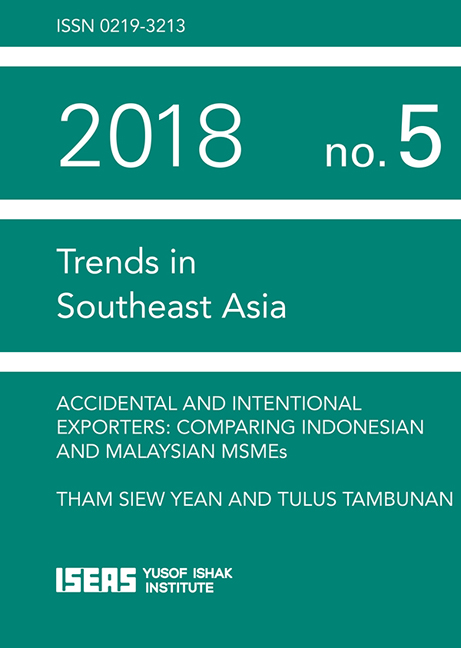Accidental and Intentional Exporters: Comparing Indonesian and Malaysian MSMEs
Published online by Cambridge University Press: 12 February 2019
Summary
INTRODUCTION
Small and medium enterprises, including micro enterprises (or MSMEs), play an important role in Southeast Asia as they contribute between 88.8 per cent and 99.9 per cent of total establishments in all sectors in the region and between 51.7 per cent and 97.2 per cent of total employment in the region. Approximately 30–53 per cent of the region's Gross Domestic Product (GDP) and 10–30 per cent of its total exports are accounted for by them as well. There are, however, considerable differences in the performance of MSMEs in the region. For example, Thailand's MSMEs contribute about 25.5 per cent of Thailand's total exports, while those in Indonesia and Malaysia contribute about 19 per cent and 15.7 per cent, respectively, to the total exports in these two economies. Likewise the policy environment for nurturing MSMEs in each of these countries differ substantially from each other, as indicated by the SME Policy Index developed by Economic Research for ASEAN and East Asia (ERIA) in 2014. The results reveal that Singapore's score is the highest, followed by Malaysia, with Indonesia and Thailand tying in third position with the same score, and lastly the Philippines for the ASEAN-5. The rest of ASEAN's member countries score at or below the ASEAN average score.
The ASEAN Economic Community (AEC), established in 2015, aims to create a highly integrated and cohesive economy that provides an expanded market for its ten member countries. In principle, this initiative should create opportunities for MSMEs in the region to grow regionally before entering the global market. However, studies have shown that MSMEs are in general not aware of the AEC and the opportunities accorded by the AEC initiatives. They remain inward-looking, as indicated by their relatively low share of total exports in their respective countries.
Most research projects focus on the challenges faced by the MSMEs, including the problems encountered in internationalizing their operations, particularly in finance, research and innovation. Thus the questions asked frequently pertain to the factors that determine MSMEs’ exports or the drivers of their internationalization, be it at the firm or country level. The proliferation of Free Trade Agreements (FTAs) has also spurred research interest in another dimension, namely, the participation of MSMEs in regional integration.
- Type
- Chapter
- Information
- Accidental and Intentional ExportersComparing Indonesian and Malaysian MSMEs, pp. 1 - 34Publisher: ISEAS–Yusof Ishak InstitutePrint publication year: 2018

